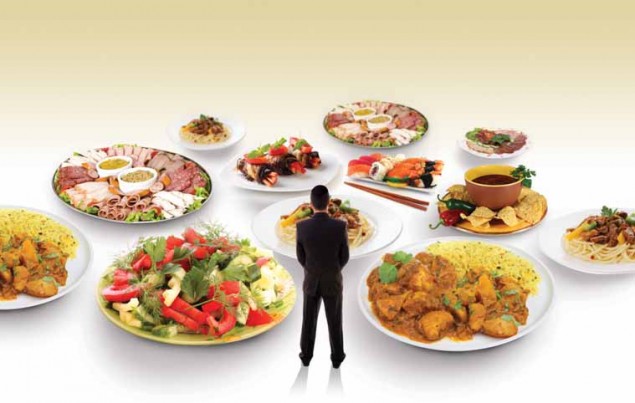Q: I am always at a loss trying to find something reasonably healthy to eat at our shul’s weekly kiddush. What do you suggest to improve kiddush fare?
A: When I think of a typical kiddush, the first thing that comes to mind is the color brown: cholent, potato kugel, chopped liver, chocolate cookies, and, of course, bourbon. Sure, a pickle sneaks its way in, and the cake frosting adds a bit of color. But overall, foods at most kiddushim are monotonously colored—and far from nutritious.
In the nutrition world, we talk about color in foods as a sign of nutrients. Dull brown foods don’t typically carry the range of nutrients we need. Vibrant colors, particularly those found in fruits and vegetables, are key sources of critical vitamins, minerals, phytonutrients (other nutrients found in plants, like lycopene), and fiber.
Lack of color is just one problem with kiddushim. Many shuls have a kiddush every Shabbat (not counting the pre-kiddush “Kiddush Club,” which, by the way, the OU condemns). Adding a hefty amount of calories and saturated fat on a regular basis in a communal setting is simply not a healthy thing to do. Many of us will indulge at the kiddush and then go home to enjoy an oversized meal. It’s no wonder we need that Shabbat nap! What kind of message are we sending to our children when, just after coming together to connect with Hashem, we insert large amounts of unhealthy foods into the bodies He gave us?
People generally want to make healthier choices, even at kiddushim. If healthy options are available, people will eat them. For example, whenever salads are served at a kiddush, they’re always finished quickly.
With that in mind, here’s how you can make over some typical kiddush foods. You can request these modifications from your caterer or, if you’re in charge of the cooking, implement them yourself:
Cholent: Beans and barley are actually good for you, with their fiber, protein, and folate. But when you take fatty meats, add oil, a hefty dose of some type of sugar (ketchup, brown sugar, honey, et cetera), the health benefits get lost. Unfortunately, leaner cuts of meat tend to dry out during the long, slow cooking of cholent, according to Susie Fishbein, author of a variety of popular kosher cookbooks. She recommends cutting the fat and calories by either using dark meat chicken for the cholent or going vegetarian.
Kugels: You probably can’t take the kugel away from the kiddush, but you can soften the nutritional blow. Stick with vegetable kugels; say no to challah or noodle kugels and certainly to cranberry-crunch or apple kugels—sorry, they’re dessert. Use egg whites or reduced-fat mayonnaise as a binder in the kugel—you don’t need both. Use only heart-healthy olive or canola oil. Skip the pie crust—you can make a delicious broccoli or cauliflower kugel without a crust. If you want to add a little crunch, sprinkle cornflake crumbs on the bottom of the pan before baking.
Crackers and chopped liver: Though a good source of iron, liver is high in fat, especially when prepared with eggs and fried onions. You can opt for vegetarian “mock liver” (made out of peas, onions and hardboiled eggs), but my choice would be to switch to other dips for your crackers (whole wheat, of course). How about protein-rich hummus or vegetable-packed Moroccan matbucha? Even pickled herring is a decent choice—as long as you watch portion size.
You’re not likely to change your shul in a week—but gradual changes will give shul members time to adjust. Also, people are less likely to notice small changes over time, but they probably will complain if you suddenly take away all their favorite foods. Here are five quick fixes you can implement quickly and easily:
• Cut foods into smaller pieces—people will eat less.
• Put out only small plates—again, this encourages smaller portions.
• Include a pitcher of fresh water with the other caloric beverages. Add a few slices of lemon to make it look more enticing.
• Baby carrots and grape tomatoes are excellent finger foods that require no prep before serving. Place these vegetables in small bowls on the tables.
• Ask the rabbi to talk about healthy eating in his derashah.
